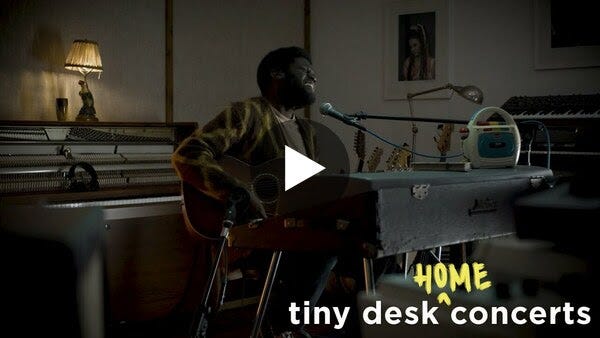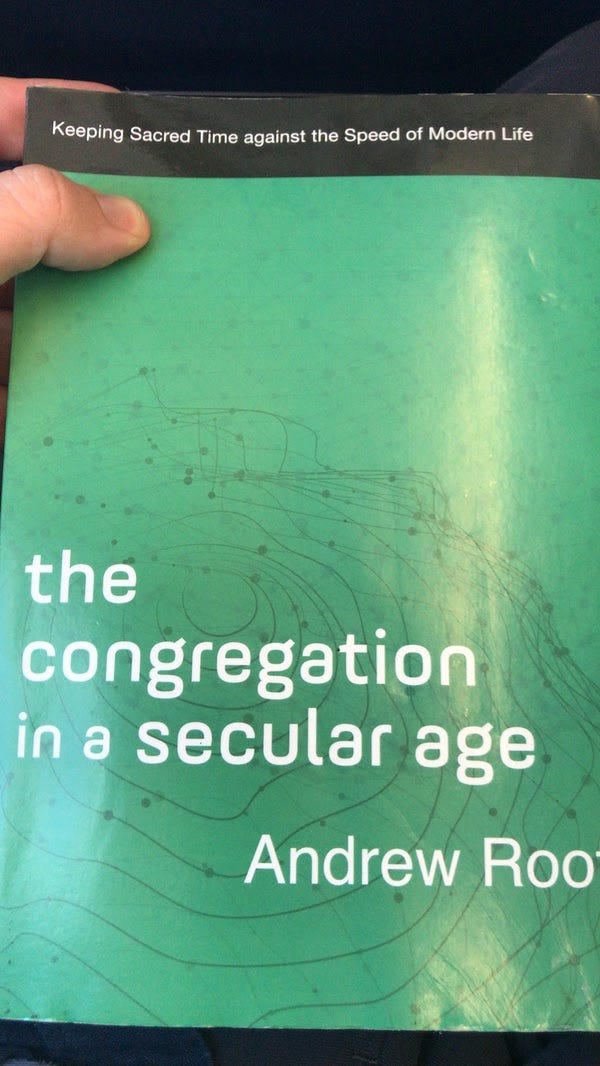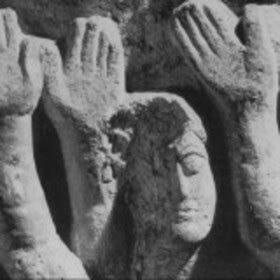The Lectio Letter - Issue #50 - How (not) to change the world , Part 3
“If there is a constructive way forward for Christians in the midst of our broken but also beautiful cultures, it will require us to recover these two biblical postures of cultivation and creation. And that recovery will involve revisiting iting the biblical story itself, where we discover that God is more intimately and eternally concerned with culture than we have yet come to believe.”
– Andy Crouch. Culture Making: Recovering Our Creative Calling
Welcome to Issue #50 of the Lectio Letter. This members-only newsletter is filled with music, film and food suggestions, links, and an article written by yours truly.
This article is the last in a three-part series on “How (not) to change the world. It’ll be helpful to read parts one and two before reading this if you haven’t already. I’m drawing on Andy Crouch’s book Culture Making to discuss the temptation to hold one of four common postures for Christians toward the world they find themselves in. We condemn, copy, critique or consume culture, but what is the right way to engage it and to be a faithful presence in our world?
It’s been a while since I published one of these Lectio letters for the wider world, so if this has caught your attention and you want to read previous articles, then help me out and become a member!
As a member, you get access to all the previous issue’s even if you only just signed up recently. Click on a previous issue and then follow the ‘already a member’ link and it will email it straight to your inbox!
The last few issues have been on:
Status Board
Life
As I mentioned in the last Lectio letter, Rachel and I had to scramble to get the paperwork together to submit our visa renewal here in South Africa. The crucial part was for me to get a new passport within 2 weeks which meant I had to take a whistle-stop trip back to the UK. I’m grateful to say that I picked up my new passport yesterday in Glasgow Scotland.
It’s been a fast trip as I flew from Cape Town on Monday, landed in Addis Ababa that evening, then flew to Athens arriving early in the morning, followed by a flight to Heathrow arriving in the afternoon. Then I took the underground into Kings Cross and a train to Harpenden. Thankfully (for me and those around me) I was at least able to get a shower in Harpenden with our YWAM friends there, who then drove me to Luton Airport where I took the last plane up to Glasgow, followed by a bus into the city centre where I crashed into bed. Quite the mammoth run.
After picking up the passport yesterday, I flew back to Luton, spent the night in Harpenden, got a lift to Heathrow, and flew to Frankfurt then Athens. Now I’ve been here on an overnight layover before my flight back to Ethiopia and onwards to Cape Town today (this email will likely go out a couple of days after writing this)!
Music
With such a short time between emails this time I haven’t been discovering much new music. Although I still heartily endorse the five or six tracks I recommended in the last email.
Michael Kiwanuka: Tiny Desk (Home) Concert
After mentioning Michael Kiwanuka in the last Lectio I’ve listened through his album “Kiwanuka” a few times and have heard his lyrics from a different perspective knowing now that he is a Christian. I particularly like the song “Light”, the last track on the album. Above is a great acoustic version from his NPR Tiny Desk Concert.
Watching
It’s winter in South Africa, and we’ve been enjoying cosying up on the couch to enjoy some TV together. We’ve watched the latest season of “For all mankind”. It’s an alternative history which starts with the premise, what if Russia made it to the moon first and then the space race never ended. It’s not sci-fi in the traditional sense of a distant future (which I’ve never been a fan of) but an alternative history which has been told from the 60’s to the 90’s. It combines enough relational intrigue for Rachel and enough thrilling political and space-related drama for me.
For All Mankind — Official First Look Trailer | Apple TV+
After receiving so much Oscar attention we watched CODA. The acronym for “children of deaf adults”. I anticipated it might be quite sentimental and cheesy, but it turned out to be genuinely profound. We warmly recommended it after watching it.
CODA — Official Trailer | Apple TV+
Finally, One of the (only) benefits of travelling without Rachel is that I can watch some suspenseful spy related drama which she cannot handle (and we never watch TV apart). On this trip, once I’m took tired to read or grade papers, I’ve been watching Tehran which charts an Israeli spy working in Iran. It’s good.
Tehran — Official Trailer | Apple TV+
Reading
I’m flying with carry-on luggage only and so I only brought one book, “The Congregation in a secular age” by Andrew Root. As with many books these days, the title doesn’t really convey the contents of the book, the subtitle “Keeping sacred time against the speed of modern life” is much more representative.
This is the third book in four books Root has released in the “ministry in a secular age” series and it is very good. Ever since running my capstone project on the discipleship benefits of the Christian Calendar, I felt like my eyes were freshly opened to how “telling the time” forms us (I’ve written about that in earlier Lectio articles).
While Root’s main dialogue partner in this series of books is Charles Taylor, a catholic philosopher, he draws from a German sociologist, Hermit Rosa, who is also a Taylor scholar. One of the most interesting insights in his work is the diagnosis that the modern or secular age is primarily the result of an acceleration of life. He argues that the increase of speed of the pace of life which is generated through our technological advancement has sped up life to an inhuman pace.
We are made to experience fullness of meaning, identity and purpose as Christians, but modernity demands that we participate with a faster pace of life which robs us from engaging with God in ways that allow true fullness to be felt.
Rather than the fullness of communion with God, Christians become entranced by the pseudo-fullness of speed or busyness. While the busyness continues we feel like we are full, meaningful and purposeful but once the busyness recedes we are left with depression and doubt as the vapid promises of fullness from busyness pass us by and we are left behind.
This is the experience of time which leads our most common metaphor connections to time to be one’s of scarcity; wasting time, running out of time and spending time. When Christians live in the slow time of connection with God, feelings of scarcity dissipate, and we realise we have identity and meaning not because of what we’ve been doing but whose we are.
In discipleship, identity is received not constructed. The pseudo-fullness we receive while we are busy convinces us that we are keeping up with the world, but part of the depression and doubt that sets in when we step away from this busyness is because we’ve been attempting to construct our own identity and we’re worried we haven’t done enough to truly achieve that.
These are just some of my initial thoughts from the book, once it simmers for a while, I might attempt to distil something from it for a future Lectio article.
How (not) to change the world , Part 3
In the first of this three-part series, I reflected on the temptation toward power and control that emerges from our pain and fear, and that we each have personal work to do that allows us to remain trusting in God rather than our own strategies to make something ‘work.’ The second part explored the two main temptations of the Church through history: to escape the world or to get so close to the world systems that we become shaped by the world rather than us shaping it.
In this final part, I want to explore how we, as the people of God, can be a “faithful presence” in society. As I discussed in the last article, we need both parts of this equation. We need to be those who are deeply faithful to the ways, work and words of Jesus, and we need to be formed by the story, vision and right desires that God has set before us.
Throughout history, and with this high calling, many Christians have decided to separate themselves from the world to such an extent that they have ended up without any meaningful witnessing presence in the world. If a desire to be faithful can lead to separatism, then a desire to be present, (or as it is more often called, to be relevant), can lead to syncretism. Syncretism is when the ways of the world begin to be mixed into the way of being Christian, effectively undercutting the faithful witness of the Church.
In his book Culture Making, Andy Crouch names four postures the American Church (and by extension, much of the evangelical world which it shapes) has held in the last decades when it comes to relating to society and the culture it creates. We can see this in many contexts but for the sake of summary, I will reference how this relates to the attitudes towards movies.
The first posture is to condemn culture. This is the fundamentalist church posture. With a deep concern for faithfulness, there is also a concern of being infected by culture. While it is true that cultural artefacts like movies can slowly shape us in ways that harm our faithfulness, this group fails to be a meaningful faithful presence in society because all they can do is condemn and opt out of the world they see around them. The message is “don’t go to the movies.”
The second posture is to copy culture. This is the evangelical church posture that wants to be relevant to the society around it. Coming out of the reactive fundamentalism of their parents, evangelicals want a non-embarrassing witness which attracts their non-believing neighbours. One of the founders of the seeker-sensitive church movement called for Christians to develop "a safe place for a dangerous message.” Church buildings were built to look more like shopping malls and movie theatres, all to attract people to what they already liked. It gave rise to the forms of church that I recently heard cynically referred to as a “Coldplay concert with a TED talk.” Christian movies, music and books are made with Christian values and messages as alternatives to non-Christian culture. The problem with this is that we are always behind the curve. If we continually take our cues from the surrounding culture then what we create is always, at best, 30 seconds out of date. The message is, "let’s make Christian movies.”
The third posture is to critique culture. This is the posture of reformed intellectual Christianity. Christians in this posture recognise that much of the culture around them carries messages and meanings that could be engaged with for the sake of revealing the God behind the creation. This is the movement that either diagnoses the ills of cultural movements or names the ache for God that exists behind the cultural products of the society that surrounds them. The problem with this posture is that its only tool is critique. Similarly to the copy culture posture, it is a reaction to a cultural creation and doesn’t offer anything other than cold, deconstructing critique. This posture starts book clubs and movie reviews discerning the code beneath the code but actually leaves most observers cold. The message is "let’s write long-form critiques of movies.”
The fourth posture is to consume culture. This is the posture of the majority of Christians today. Embarrassed by their grandparents who opted out into fundamentalism, cringing at their parents for trying to ‘copy cool,’ and too confused to analyse, we simply consume. If the world is talking about a Netflix show, we watch it. If the world wants the latest iPhone, we buy it. The message is “let’s watch all the movies.”
At this point, you may be wondering what the fifth posture might be that Andy Crouch endorses in his book. Surprisingly, instead of offering a single posture, a kind of "one ring to rule them all” approach, Crouch defends all four.
He acknowledges that there are things we need to condemn. There is no redemptive value in pornography or sex trafficking, and the only worthwhile response to these is to condemn them. There are also things worth copying. Long before CCM artists began to sound like U2 and Coldplay, Luther and Wesley were putting Psalms and hymns to drinking songs. Likewise, architecture for churches and cathedrals have always drawn from their surrounding cultures to make them architecturally sound and beautiful. There are also things worth critiquing. A large proportion of art these days is designed to be critiqued, its purpose being to create reflective meaning and form. Finally, there are cultural goods worth consuming. I can enjoy a beautifully-made meal, cup of coffee or the odd Netflix show and that is entirely appropriate given what those things are.
Crouch argues that these options are all appropriate in different contexts, and the key is discernment. When gestures turn into “postures,” we have created a problem. Let me give you an example:
Thirteen years ago when we came to South Africa, we were joined by a man who had recently left the military after a number of tours in Iraq. As we walked around the foreign context of a mission outreach, we began to notice something peculiar. Our friend would walk around greeting people in a friendly but curt manner. His body posture was tense, and at times it seemed like his hands were in front of him carrying an invisible item. We soon realised this invisible item was his rifle, and he held the tense posture he must have held when walking through towns while in Iraq. His body had learned a way to carry itself in places of uncertainty and discomfort that was difficult to shake off. The posture held in conflict is not the most helpful posture in a mission context.
There are times in my day when I need to crouch down to the floor to pick something up, but if I spent all day crouched down, my muscles and bones would begin to conform to that posture, making other gestures much harder to engage in.
Crouch argues that when these appropriate gestures of condemning, copying, critiquing and consuming become hardened through thoughtless repetition, we end up feeling like the gesture we have chosen is the only one available to us. Once our gestures harden into postures, the other gestures seem simply too hard to consider and adopt. This process of hardening into a posture is further endorsed and celebrated when we find a like-minded tribe. Our tribe reinforces our posture, and we suddenly find ourselves believing our posture is right and other postures are wrong.
Without realising it, we effectively discard the crucial discernment process of relying on the Holy Spirit. Each of these legitimate gestures can become our way of no longer doing the hard work of relying on our connection to God by the Holy Spirit to engage in discernment. As I said in the very first part of this series, relying on a rule is much easier than sustaining a relationship. But the problem with no longer relying on God to help us discern the way we interact with society leads us to a place where we can no longer be a faithful presence.
The problem is far bigger than just not being able to act or respond rightly to our world. The tragedy is that we are no longer the place where the world encounters the living God because all we have become is a people witnessing to our reliance on a tribal coping posture.
If we, as the people of God, are to embody the hope of God for the sake of the world, we need to relinquish our trust in hardened postures towards the world and instead receive 'hearts of flesh’ which commune with the living God and lead faithful lives marked by the presence of God.
Miscellaneous Link List
I was emboldened recently by reading a short blog post from the, ever-insightful, Alan Jacobs, where he describes his own pivot from critique to creation.
The Homebound Symphony – Snakes and Ladders
One of the unexpected outcomes of my recent reading and curriculum development around the idea of the kingdom of God has been to think about the posture of Christians within wider society.
I think this came out most clearly from Andy Crouch’s culture making; that much of Christianity is either simply consuming culture or critiquing it. I’ve recognised much of the last few years of my life I have gained a number of helpful lenses through which two critique the culture around us.
In particular to notice how the religious undertones to a supposedly secular context leave us worshipping things that don’t deserve to be worshipped and giving our lives and blood to things that simply will not bring life. While unmasking these deceptions are key aspects of discernment, the posture of critique and analysis is inevitably a cynical one.
We are easily left in a similar situation to us round in culture which I have named another place as “the Humpty Dumpty problem”. We have taken something apart that we simply cannot put back together again. Or to put it more plainly it is much easier to deconstruct than it is to construct. It is easier to be an armchair critic than a builder. My goal in the coming years to figure out what it means to make a constructive and creative contribution to the world rather than simply being able to dismantle it with nuanced analysis and critique.
God help me.
While I have been attracted to the forms of my Anglican upbringing, I spent many years in a Methodist congregation as a child.
The county in England I grew up in, Cornwall, was deeply shaped by Methodism more than any other Christian movement.
And although Charles and John Wesley are credited with starting the movement, it was actually formed most through the life and influence of their mother Susanna Wesley.
It does seem to me that one of the blindnesses of the modern evangelical movement (of which I am a part) is an attraction to male saints and heroes of the faith at the expense of us honouring the many women who have, often, paid much deeper and hidden costs to sustain their faithful witness. I’ve wondered if, in addition to a latent patriarchalism it is also a result of the pendulum away from the abuses of roman Christianity in its veneration of Mary
I am grateful for the work of the prayer 24/7 ministry Lectio 365 for turning attention to Suzanna Wesley recently. Highlighting her life and sharing this rich prayer of hers that is as worthy of repetition as much as anything out of the common book of prayer;
Help me, Lord, to remember that religion is not to be confined to the church, or closet, nor exercised only in prayer and meditation, but that everywhere I am in Your presence. So may my every word and action have a moral content. May all the happenings of my life prove useful and beneficial to me. May all things instruct me and afford me an opportunity of exercising some virtue and daily learning and growing toward Your likeness. Amen
Listen to the full devotional here.
One of the ways in which secularism has muted Christian faith has been through the capitulation of previously Christian institutions that had motivations (financial or otherwise) to have a broader base.
Stanley Hauerwas has been a primary voice in the last decades of denouncing this kind of vague public religion. During a discussion in the recent M.A. Intensive, I read out this classic humourous and insightful story Hauerwas tells in His published prayerbook “Prayers Plainly Spoken”.
The call came from the president’s office asking me to pray before the Distinguished Professor’s luncheon. Reynolds Price, the distinguished novelist and member of the English department at Duke, was to give the presentation that day. Since I have harshly and repeatedly criticized civil religion, I at first turned down the opportunity to pray to a vague God who cannot be named as the Father of Jesus Christ. I knew such a “public” occasion, involving people of many faiths, would have people expecting just such a civil religious address of God. But then I reconsidered and called back saying I would do it. It took me all morning to write the prayer.
God, you alone know how we are to pray to you on occasions like this. We do not fear you, since we prefer to fear one another. Accordingly, our prayers are not to you but to some “ultimate vagueness.” You have, of course, tried to scare the hell out of some of us through the creation of your people Israel and through the life, death and resurrection of Jesus. But we are a subtle, crafty and stiff-necked people who prefer to be damned into vagueness. So we thank you for giving us common gifts such as food, friendship and good works that remind us our lives are gifts made possible by sacrifice. We are particularly grateful for your servant Reynolds Price, who graces our lives with your grace. Through such gifts may our desire for status and the envy status breeds be transformed into service that glorifies you. AMEN.
A vague God vaguely prayed to serves no one well. I can report that because of my intervention (and perhaps, prayer) we no longer have a prayer at this event at my university. Instead we have a moment of silence.
When we need to show our work | Seth's Blog
I appreciated this short post by Seth Godin on clear communication;
If you’re basing your proposal on facts, the scientific method, calculations and effectiveness, please show your work…
If, on the other hand, your proposal is based on belief and opinion, tell us. You’re entitled to both. And the rest of us are allowed to disagree.
I discovered this recently quite pointedly by marking trial research papers by Christian workers in the M.A. We are so prone to rely on rhetorical persuasion that it makes it difficult to make well-grounded points in any other way.
Experimental Theology with Richard Beck
Part 1, What Comes First? Virtue or Practice?
richardbeck.substack.com • Share
What Christian discipleship focuses on is not on the experiences we have, but who we become as a result of those experiences.
It often takes sustained and disciplined practices to open up the space, for example, to remain consciously aware of God’s presence with us. This leaves us with a challenge because the virtue of discipline is something that can only be attained through practices, but the practices require the virtue of discipline. This is what Richard Beck insightfully explores in this short article. The follow-up on White fragility is worth a read too.
As we began our recent Masters intensive which explored Christian involvement in politics and the implications of power and allegiance to our nation we were in the midst of the queen’s jubilee.
It has become quite the progressive virtue signal to call out a national flag being at the front of churches. I to0, am uncomfortable with such a sign of allegiance as it puts us in deep danger of syncretism. That being said, the progressive critique is often aimed at “those” over there and a real alternative to live and participate in a country is lost. I knew there would be those in the room of the recent intensive much like myself who would be keen to push back against this kind of twin allegiance between nation state and Christianity and yet here we were in the UK, in a chapel full of British flags! I knew that would be less offensive than to have walked into a Church in the southern states and have seen an American flag at the front. But what is the difference? We’re in real danger of hypocrisy if we think there is one.
That led me to another question, what does it mean for us to love our country and what kind of liabilities does that hold for those of us that want to train our loves to Jesus above all?
Because of all of this, I found this book review of Mouw’s recent book “How to be a Patriotic Christian” so engaging.
The 2022 Uber Lost & Found Index | Uber Newsroom
We’re back with the annual Uber Lost & Found Index, a snapshot of our riders’ most commonly forgotten and most unique lost items from the past year.
Uber shares its most common, as well as most wacky lost and found requests;
The 10 most commonly forgotten items:
Phone / camera
Wallet
Keys
Backpack / purse
Headphones / speaker
Glasses
Clothing
Vape
Jewelry
ID
A few of my favourites from the wacky list;
My fingernail is on the seat
500 grams of caviar
My grandma’s teeth
6 pool drains and an Employee of the Month plaque
Breathalyzer
I lost 40 chicken nuggets
A crochet strawberry my girlfriend made me. It means a lot to me.
Painting of Kung Fu Panda and pink air pump shaped as a pig
Urn with pet ashes + urn of family member
Loose pear-shaped diamond. $1000 reward if found!
A single blonde strand of hair
10lbs of hamburger meat
Also;
Keys: Toyota keys are the most frequently left behind, followed by Honda, BMW and Jeep.
Sweet teeth: More than 30 riders for their retainers, more than 20 riders forgot their gold or diamond encrusted grills, and 5 folks left their dentures on the backseat.
All-female team breaks world record by rowing from California to Hawaii - ABC News
An all-female rowing team has set a new world record rowing from San Francisco, California to Honolulu, Hawaii in the Great Pacific Race.
Junior Lifeguards Help Rescue Pilot After Small Plane Crash in Huntington Beach
Two junior lifeguards were one of the first in the water to help a pilot of a small plane that crashed in the Huntington Beach surf on Friday.
Japanese Village Plants Different Types of Rice To Grow Giant Homage To Art History
A village in Japan unveiled their latest rice paddy art which depicts two famous female portraits from art history.
This Year's Funniest-Looking Pets Are Here
Chess-playing cats, water-loving dogs, and happy horses are among the finalists of the 2022 Comedy Pet Photography Awards.
That’s all for now!
Liam

























